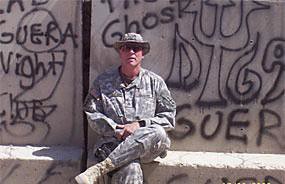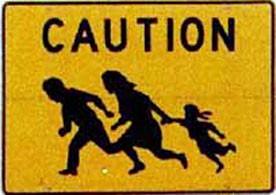Blacks and Immigration Reform: Conflicted, But Why? by Anthony Asadullah Samad
In a strange twist of events leading up to the “Day Without Mexicans” protest, there was suddenly this overwhelming focus on where African Americans stood on the issue. While this focus certainly was heightened by a half-cocked Ted Hayes rollin’ into Leimert Park with Minutemen in tow, talkin’ about Black people will help immigrants build an economy in Mexico. Hayes is clearly the latest iteration of Sambo politics that advances the position of the conservative right without any concern of how crazy he really makes black people look. Of course, the media is there front and center, while a few so-called “black spokespersons” front off the whole race escalating Black/Latino tensions on a whole ‘nother front simply because some folk want to scapegoat immigrants and play up the politics of fear that permeate two already exploited communities. These Negroes are trying to do to immigrants what America did to Blacks at the end of the 19th Century when poor whites decried that Blacks were taking their jobs because of industrialization. That’s what makes this dangerous.
The fact that African Americans feel the need to take position needs to be called into question. There has been no Latino “litmus test” on HR 40 (Reparation bill) or even where Latinos stand on police abuse or jailhouse attacks on African Americans. We tend to cooperate where we can, but each community has its own issues. Yet, “are you with us” is now a prevailing inquiry among Blacks and Latinos. Certainly any group that knows the social change history of Blacks in America (including the history of the “Day of Absence” for which this protest was modeled) know that our involvement in social (and political change) is crucial. Yeah, this legislation is targeting Mexicans, but Haitians, Jamaicans, and Africans impacted by this bill. We should be allies in advocating for compassionate reform. Solidarity where possible. That’s how it’s always been.
There are deeper issues here. The concern that immigrants take jobs from black people drives the opposition. It’s a false premise that has nothing to do with immigration, and everything to do with competition. Immigrants don’t take work—they make work. They sell fruits, or flowers or other goods. Most of the jobs they fill are not jobs Blacks want. I know over three dozen upper middle class black families looking for black gardeners but can’t find one. It’s the same with housekeepers, babysitters, live-in nannies and day laborers. The competition between Black and Latinos (on all levels) stem from the networks each creates that support their desire to work and improve their communities. Only 25% of all jobs in America are advertised. The rest are “inside referrals.” Work is disappearing for African Americans because we want to be the only one on the job and put little in the job “pipeline.” Latinos refer who they know. Blacks used to do the same.
Blacks could provide enough jobs for everybody to work if they’d only support themselves. In 1965, it was Jewish businesses taking work from Blacks. In 1992, it was Koreans. Now, it’s immigrants. And opposing Blacks think they can help immigrants build their “own country.” Yeah, right? That’s pure rhetoric and the source of the confliction on this issue—an issue not really ours. Blacks can’t build their own economy here in America. We need not play the role of being victims.
Wanna know our issue? Black America’s focus should not be on who’s taking jobs, but who’s making jobs. When Blacks learn how to make work, they’ll have work. Immigration won’t even be an issue. It’s not for any other community who simply make work for their people to work.
Anthony Asadullah Samad is a national columnist, managing director of the Urban Issues Forum (www.urbanissuesforum.com) and author of 50 Years After Brown: The State of Black Equality In America. He can be reached at www.AnthonySamad.com


